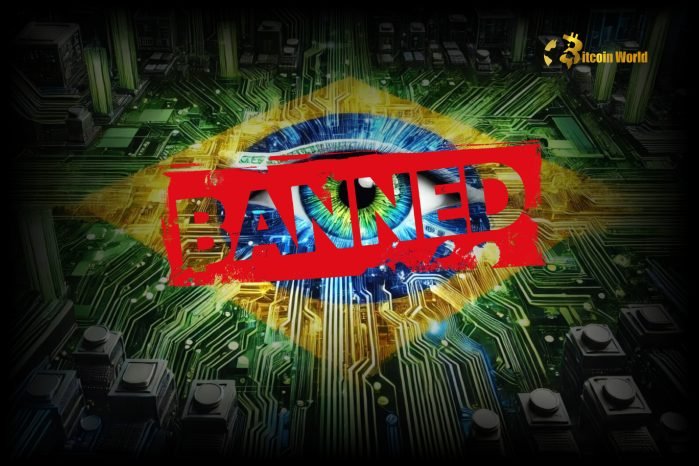The crypto world is once again buzzing with regulatory news, and this time, it’s centered on Brazil and Worldcoin, the ambitious project co-founded by OpenAI’s Sam Altman. Brazil’s National Data Protection Authority (ANPD) has firmly rejected Worldcoin’s appeal, deciding to uphold the ban on its operations within the country. This decision spotlights the intensifying global debate around crypto privacy concerns and the use of biometric data in the digital age. Let’s dive into the details of this significant development and what it signifies for the future of cryptocurrency and data protection.
Why Did Brazil Uphold the Worldcoin Ban?
The core of the issue lies in Brazil’s concerns regarding Worldcoin’s data collection practices. The ANPD specifically cited apprehension that Worldcoin’s method of distributing crypto payouts in exchange for biometric data—iris scans, to be precise—could unduly influence consumer behavior. This raises critical questions about informed consent and the potential for exploitation, especially in regions where financial incentives might outweigh privacy considerations. In essence, the regulator is worried that users might not fully grasp the implications of handing over their biometric data for relatively small crypto rewards. This decision underscores Brazil’s proactive stance on data protection and its commitment to safeguarding citizens from potentially manipulative practices within the burgeoning cryptocurrency sector.
Brazil Crypto Regulation: A Stricter Stance on Data Privacy?
Brazil’s firm stance on the Worldcoin ban isn’t happening in a vacuum. It reflects a broader trend of increasing scrutiny on crypto activities globally, particularly concerning data privacy. The ANPD’s decision emphasizes that Brazil is taking a proactive approach to Brazil crypto regulation, prioritizing user data protection in the face of innovative, yet potentially intrusive, technologies. This move could set a precedent for other nations grappling with similar issues arising from the intersection of cryptocurrency and biometric identification. It signals that regulators worldwide are paying close attention to projects that involve the collection of sensitive personal data in exchange for digital assets. The key takeaway here is that while innovation in crypto is welcomed, it must be balanced with robust safeguards to protect individual rights and privacy.
Understanding Crypto Privacy Concerns with Worldcoin
Crypto privacy concerns are at the heart of the Worldcoin controversy. While proponents argue that projects like Worldcoin are essential for creating a globally inclusive digital identity system and distributing crypto more equitably, critics raise valid points about the risks associated with collecting and storing biometric data on a massive scale. Here’s a breakdown of the key privacy concerns:
- Data Security Risks: Storing millions of iris scans creates a massive honeypot for hackers. A data breach could expose highly sensitive biometric information, leading to identity theft and other forms of misuse.
- Consent and Coercion: Are users truly giving informed consent when offered crypto in exchange for their iris scans? Especially in economically vulnerable regions, the incentive might be too strong, blurring the lines of genuine consent.
- Data Usage Transparency: How exactly will Worldcoin use the collected biometric data beyond issuing “World IDs”? Lack of transparency about data processing and potential future uses raises red flags.
- Centralization of Biometric Data: Entrusting a single entity with a vast database of biometric information creates a centralized point of control and potential abuse.
These concerns are not unique to Worldcoin, but the scale of its ambition and its reliance on biometric data amplify the potential risks. Regulators like Brazil’s ANPD are tasked with balancing innovation with the paramount need to protect citizen’s fundamental rights to privacy.
Biometric Data Crypto: A Risky Combination?
The concept of biometric data crypto, where digital currencies are intertwined with biometric identification, presents both exciting possibilities and significant challenges. On one hand, biometrics could offer a more secure and user-friendly way to manage crypto identities and transactions. Imagine a future where you can authorize crypto payments with a simple iris scan or fingerprint, eliminating the need for complex passwords or private keys. However, the risks associated with combining these two powerful technologies are undeniable.
Consider these points:
| Benefit | Challenge |
|---|---|
| Enhanced Security (potential for passwordless transactions) | Increased vulnerability to biometric data breaches |
| Improved User Experience (easier crypto access and management) | Risk of coercion and compromised consent in data collection |
| Potential for inclusive digital identity systems | Ethical concerns about centralized biometric databases |
As the biometric data crypto space evolves, robust regulatory frameworks and ethical guidelines are crucial. Striking the right balance between innovation and risk mitigation will determine whether this technology can realize its potential while safeguarding user privacy and security.
Sam Altman Worldcoin: What’s Next for the Project?
Despite the setback in Brazil, Sam Altman Worldcoin project is not backing down. Worldcoin has stated that it respects the ANPD’s decision and will comply with the order to halt payouts in Brazil. However, they also emphasize that they will keep their locations open to provide public information, indicating a commitment to transparency and continued engagement with the Brazilian market. The project maintains its belief in its mission and technology, suggesting they will likely continue to work with regulators to address concerns and potentially seek to resume operations in Brazil in the future.
The 10-day deadline for Worldcoin to confirm the halt of payouts in Brazil marks a critical juncture. How Worldcoin responds and adapts to these regulatory challenges will be closely watched by the crypto industry and privacy advocates alike. The outcome in Brazil could influence regulatory decisions in other jurisdictions and shape the future trajectory of projects that rely on biometric data collection within the crypto ecosystem.
Conclusion: Navigating the Future of Crypto and Privacy
Brazil’s rejection of Worldcoin’s appeal serves as a stark reminder that the crypto industry is operating in an increasingly regulated environment. While innovation is vital, it cannot come at the expense of fundamental rights like data privacy. The Worldcoin situation highlights the urgent need for open dialogue and collaboration between crypto projects, regulators, and privacy experts to establish clear guidelines and best practices for the responsible use of biometric data in the digital currency realm. The future of crypto hinges on building trust and ensuring that technological advancements serve humanity without compromising individual liberties.
To learn more about the latest crypto market trends, explore our article on key developments shaping Bitcoin institutional adoption.
Disclaimer: The information provided is not trading advice, Bitcoinworld.co.in holds no liability for any investments made based on the information provided on this page. We strongly recommend independent research and/or consultation with a qualified professional before making any investment decisions.





